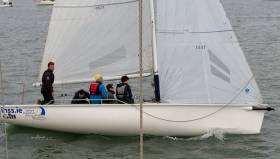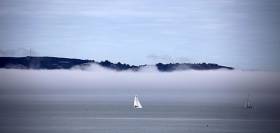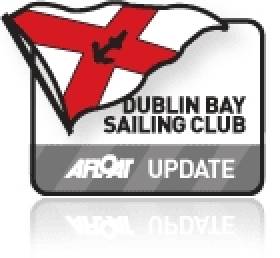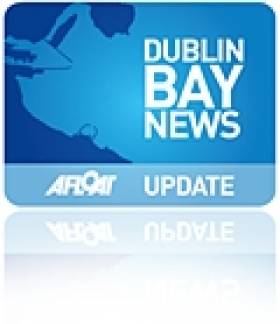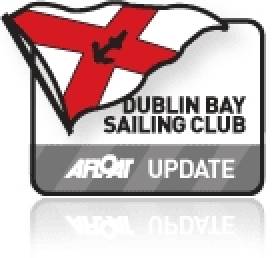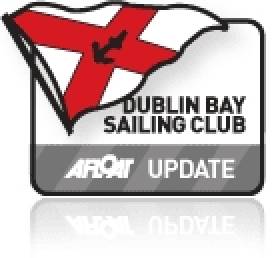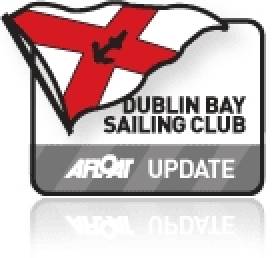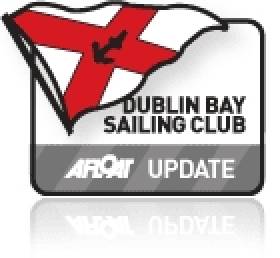Displaying items by tag: spring Chicken
INSS DBSC Spring Chicken Winners Are Round Ireland Lynx Crew
The Team INSS win in last weekend's 46–boat Dublin Bay Sailing Club Spring Chicken Series represented much more than just a win as it represented an important milestone in an offshore racing campaign. Look closer at the INSS 1720 crew and you will see that it was largely made up of those that will race onboard LYNX, the Reflex 38 owned by the INSS, which is giving five people the chance to race Round Ireland on a thoroughbred race boat.
Kenny Rumball, who skippered the 1720, and will skipper LYNX this June, elected to use the DBSC Spring Series as training for the Round Ireland Campaign. Now that the experienced crew are in shape for the season, INSS thoughts are turning to bringing the whole crew together.
The LYNX yacht itself has undergone a few changes ahead of this year’s race and the first training weekend for the crew is coming up on the 16th & 17th of April. Four of the five slots have been filled and there is still one spot up for grabs for a budding offshore racer who wants to compete in the Round Ireland and learn, all while being part of an experienced offshore racing crew.
With an intensive training programme coming up, including two training weekends and four ISORA races including deliveries, the crew should be well honed prior to the start of the campaign. There’s more details on the Round Ireland Campaign on Lynx available here.
Team INSS, a 1720 sportsboat skipperd by Kenny Rumball, emerged as winner of the 46-boat Rathfarnham Ford sponsored DBSC series that concluded in light airs and low cloud this afternoon on Dublin Bay. The Sailing School entry was followed home by another 1720, Deja Vu and the Beneteau 34.7 Adelie in third place.
Full overall results now downloadable below.
DBSC Spring Chicken Series Sailing Instructions Published
Sailing Instructions for this weekend's DBSC Spring Chicken Series hosted by the National Yacht Club have been published (download a copy below). An estimated fleet of 40 or 50 will be racing each Sunday morning on Dublin Bay from 7th February to 13th March 2016 inclusive.
DBSC Spring Chicken Series To Start on February 7
Dublin Bay Sailing Club (DBSC) will stage its annual Spring Chicken Series, a series of six races to be held on Sunday mornings from February 7th. Racing under modified ECHO handicap, cruisers, cruising boats, one-designs and boats that do not normally race are very welcome.
As an incentive to get people sailing, a boat that takes out a non–sailor (new to sailing) will get a 2% discount on it’s handicap that day. The non-sailor will qualify as such for three races if taken. To qualify names can be registered before sailing on the day.
The Entry fee €60.00 – includes temporary membership of Dublin Bay S.C. and National Y.C.
Entry form and the notice of race are downloadable below.
#dbsc – After two weekends of abandoned racing, this week's weather forecast gives a much more favourable picture for Sunday's fourth race of the Rathfarnham Ford sponsored DBSC Spring Chicken Series.
Attached below are the start times & handicaps for the next race.
An amendment to the Sailing Instructions, to provide for an extra race to be held on 22nd March in lieu of the two races lost, is also attached.
The series prize-giving will also be on that day at the National Yacht Club.
#dbsc – Strong westerly winds gusting to 40 knots put paid to both the DBSC Spring Chicken handicap keelboat series and the DMYC dinghy frostbites on Dublin bay today.
The cruiser event was abandoned just before its first gun this morning. It is the second week running that strong winds have forced cancellation. The plan now, say organisers, is to run an extra race on March 22nd with no race on the 15th due to St. Patrick's weekend.
DBSC Spring Chicken Series - Notice of Race & Entry Form Here!
#dbsc – Following on from DBSC's successful pre–Christmas Turkey Shoot Cruiser series, Dublin Bay organisers have unveiled the '2015 Spring Chicken', running from 1st February to 8th March. It's a series of six races that does not impact on St. Patrick's weekend holidays. A Notice of Race and Entry Form are attached below. Rathfarnham Ford are series sponsors.
All Eyes on Last Race of DBSC Spring Chicken Series
#dbsc – DBSC's Spring Chicken Series has produced an interesting set of overall results with one race left to sail on March 23rd. Race organiser Fintan Cairns says he hasn't seen such a close set of results for a long time. The first dozen or so boats in the 40–boat fleet are nearly all at only one point difference between each place.
Results for last Sunday,handicaps and starts for 23rd March are downloadable below.
Sunday's DBSC Spring Chicken Sailing Series Draws 40–Boat Fleet for First Event of 2014
#dbsc – Two Sailing School 1720 sportsboats from the Irish National Sailing School (INSS) in Dun Laoghaire are part of a 40–boat Dublin Bay Sailing Club (DBSC) Spring Chicken Series that starts tomorrow at the National Yacht Club. See entry sheet downloadable below.
Organisers are hoping that today's westerly storm blows through as forecast for the first race tomorrow morning. There will be four starts (see xcel sheet downloaadble below) for the handicap fleet. The February event is sponsored by Rathfarnham Ford.
DBSC Launches 2014 Spring Chicken Series at the National Yacht Club
#dbsc – The National Yacht Club will host Dublin Bay Sailing Club's Spring Chicken series starting on 2nd February and running until March 9th. It follows the 70–boat Turkey shoot that ran up to Christmas. Both series are being sponsored by Rathfarnham Ford. Entry form and a Notice of Race are attached for download below.
A series of six races will be held on Sunday mornings on Dublin Bay and scored under modified ECHO. Cruisers, cruising boats, one-designs and boats that do not normally race are very welcome, according to race organiser Fintan Cairns.
Again, as an incentive to get people sailing, a boat that takes out a NON-SAILOR (new to sailing) will get a 2% discount on it's handicap that day. The non-sailor will qualify as such for 3 races if taken. Names must be registered before sailing on the day.
The entry fee of €60.00 includes temporary membership of Dublin Bay S.C. and National YC


























